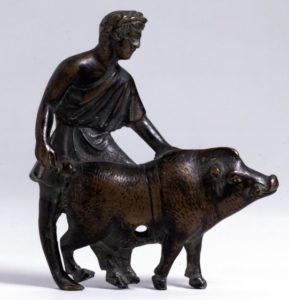Antiochus IV Epiphanes–Accurately Foretold by Daniel
Antiochus IV Epiphanes ruled the Seleucid (Syrian) kingdom from 175 to 164 BCE, and was foretold by Daniel, prophet of Yahweh. Epiphanes means “manifest,” and the name indicates that he claimed to be the earthly manifestation of Zeus. Antiochus attempted to unify his empire by imposing Hellenistic culture upon all its inhabitants. This policy brought him into sharp conflict with the Jews of the region later known as Palestine. Most Biblical scholars believe Antiochus to have been the “small” horn in Daniel 8:9 and the “contemptible person” of 11:21. His relations with the Jews are recorded in 1 and 2 Maccabees (Apocryphal books) and are prophetically depicted in Daniel 8:9-14,23,25 and 11:21-34. “Then from one of the prominent horns came a small horn whose power grew. very great. It extended toward the south and the east and toward the glorious land of Israel” (Daniel 8:9 NLT). He was infamous for establishing pagan worship in the Jerusalem temple.

In about 174 BCE, Jason, the leader of a pro-Greek faction in the Jerusalem priesthood, bribed Antiochus to install him as high priest, after which Jason set about turning Jerusalem into a Greek city (2 Maccabees 4:7-22). In 171 BCE, however, another man, Menelaus, in turn bought the priesthood from Antiochus. Jason, believing that Antiochus had died, seized Jerusalem by force. But Antiochus returned in 169 and carried out a massacre of the city. “Its power reached to the heavens, where it attacked the heavenly army, showing some of the heavenly beings and some of the stars to the ground and trampling them” (Daniel 8:10 NLT). He then moved upon Egypt but was humiliated by the Roman legate C. Popilius Laenas and forced to make an undignified withdrawal to the north. Thereafter, this tyrant vigorously sought to Hellenize Jerusalem.
In 167 BCE, Antiochus dispatched his tax collector Apollonius against Jerusalem with 22,000 men. They attacked on the Sabbath, killing most of the male population and enslaving the women and children. Jerusalem’s walls were demolished and a Seleucid military garrison stationed immediately south of the temple. All Jewish rites were outlawed, resulting in the cessation of the daily sacrifice. An altar to Zeus was erected over the Jewish altar of burnt offerings, and worship of Zeus was instituted in the temple. “It even challenged the Commander of heaven’s armies by canceling the daily sacrifices offered to him and by destroying his Temple.The army of heaven was restrained from responding to this rebellion. So the daily sacrifice was halted, and truth was overthrown. The horn succeeded in everything it did” (Daniel 8:11,12 NLT). On December 25, 167 BCE, a pig was sacrificed on the Zeus altar; this was the “abomination that causes desolation” in Daniel 9:27; 11:31 and 12:11.
“‘How long will the rebellion that causes desecration stop the daily sacrifices? How long will the the Temple and heaven’s army be trampled on?’ . . . ‘It will take 2,300 evenings and mornings, then the temple will be made right again'” (Daniel 8:13,14 NLT).
Enraged, the Jews rebelled against their Greek overlords and, under Judas Maccabeus, defeated the armies that Antiochus had sent against them. After a three-year struggle, Jewish forces gained major concessions from the Greeks, and the Maccabees became the de facto rulers of Judea. Most notably, they purified the temple and reinstated the daily sacrifice, an event commemorated in the feast of Hanukkah. Antiochus himself, who had moved off to the east to campaign in Elam, died in Persia in 164 BCE.
God’s prophet Daniel accurately foretold Antiochus IV Epiphanes.
MAIN SOURCE: NIV Archaeological Study Bible 2005